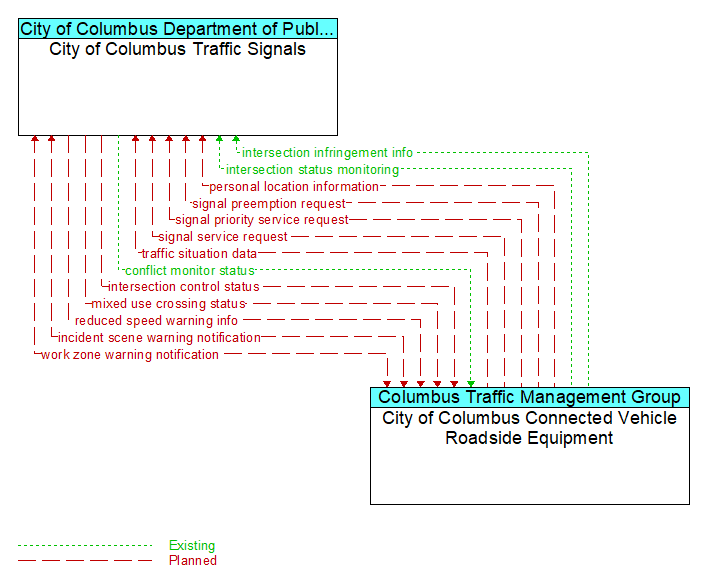Interface: City of Columbus Traffic Signals - City of Columbus Connected Vehicle Roadside Equipment

Architecture Flow Definitions
conflict monitor status (Existing) Applicable ITS Standards
A control flow that supports failsafe operation in the event that a conflict is detected that requires the RSE to enter a failsafe operating mode.
incident scene warning notification (Planned ) Applicable ITS Standards
Notification of an incident scene emergency or safety issue. This flow identifies that an incident scene emergency or safety issue has occurred so that warnings may be generated by more than one system in the work zone.
intersection control status (Planned ) Applicable ITS Standards
Status data provided by the traffic signal controller including phase information, alarm status, and priority/preempt status.
intersection infringement info (Existing) Applicable ITS Standards
Vehicle path information sent by a vehicle that is violating the stop bar at an intersection. This flow includes the vehicle's position, heading, speed, acceleration, transmission, steering–wheel angle, braking status, size information and trajectory.
intersection status monitoring (Existing) Applicable ITS Standards
Current signal phase and timing information for all lanes at a signalized intersection. This flow represents monitoring of communications by a receiver at the intersection to support monitoring for conflicts between actual signal states and RSE communications about those states.
mixed use crossing status (Planned ) Applicable ITS Standards
Current pedestrian and other mixed use crossing information including an indication of whether the call button has been activated, the current state of the mixed use crossing signal, and information indicating whether non–motorized users are currently occupying the cross walk.
personal location information (Planned ) Applicable ITS Standards
Pedestrian, bicyclist, and other non–motorized user locations at an intersection as detected and reported by an RSE.
reduced speed warning info (Planned ) Applicable ITS Standards
Real time notification of vehicle detections, measured vehicle characteristics (e.g., vehicle height), speed measurements, and warnings issued by roadway infrastructure. This flow can also include roadway configuration data, current speed limits, and warning parameters and thresholds enabling local speed management application configuration and management.
signal preemption request (Planned ) Applicable ITS Standards
Direct request for preemption to a traffic signal controller that results in preemption of the current control plan and grants right–of–way to the requesting vehicle. This flow identifies the required phase and timing of the preemption. This flow may also cancel the preemption request (e.g., when the requesting vehicle clears the intersection).
signal priority service request (Planned ) Applicable ITS Standards
A service request for vehicle priority issued to a traffic signal controller that results in green extension or other accommodation for the priority vehicle, within the current signal timing plan. The request includes the priority level, the desired time and duration of service, and the intended travel path through the intersection. This flow also allows the RSE to cancel a previously issued request for priority.
signal service request (Planned ) Applicable ITS Standards
A call for service or extension for a signal control phase that is issued by the RSE for connected vehicles approaching an intersection and/or pedestrians at a crosswalk. This flow identifies the desired phase and service time.
traffic situation data (Planned ) Applicable ITS Standards
Current, aggregate traffic data collected from connected vehicles that can be used to supplement or replace information collected by roadside traffic detectors. It includes raw and/or processed reported vehicle speeds, counts, and other derived measures. Raw and/or filtered vehicle control events may also be included to support incident detection.
work zone warning notification (Planned ) Applicable ITS Standards
Notification of a work zone emergency or safety issue. This flow identifies that a work zone emergency or safety issue has occurred so that warnings may be generated by more than one system in the work zone.